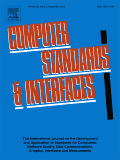
COMPUTER STANDARDS & INTERFACES
Scope & Guideline
Advancing the Future of Computing Standards.
Introduction
Aims and Scopes
- Interoperability in Computing Systems:
This area explores methods and standards that facilitate seamless interaction among different computing systems, ensuring compatibility and effective communication across platforms. - Security Protocols and Privacy Measures:
Research in this scope focuses on the development and analysis of security protocols, privacy-preserving techniques, and methods to safeguard data integrity in various applications including cloud computing, IoT, and blockchain. - Usability and User Experience in Interfaces:
This theme involves studies aimed at improving user interaction with computing systems, emphasizing the design and evaluation of user interfaces to enhance usability and accessibility. - Blockchain and Distributed Ledger Technologies:
The journal covers advancements in blockchain technologies, focusing on their applications in security, data integrity, and decentralized solutions for various industries. - Machine Learning and Artificial Intelligence Applications:
This area investigates the application of machine learning and AI techniques in enhancing system performance, security, and data processing capabilities. - Software Engineering Practices and Methodologies:
Research under this scope looks at methodologies, frameworks, and practices in software engineering, including agile methodologies, DevOps practices, and process improvement frameworks.
Trending and Emerging
- Privacy-Preserving Technologies:
There is a notable increase in research surrounding privacy-preserving technologies, particularly in the context of cloud computing and IoT, as concerns over data privacy and security amplify. - Blockchain Innovations:
Emerging themes include innovative applications of blockchain technology beyond cryptocurrencies, particularly in data integrity, secure transactions, and decentralized applications. - AI and Machine Learning Enhancements:
An increase in publications focusing on the integration of AI and machine learning in various applications indicates a trend towards leveraging intelligent algorithms to optimize processes and enhance decision-making. - Interoperability Standards for IoT:
With the growth of IoT devices, there is a rising emphasis on establishing interoperability standards that facilitate communication and data exchange among diverse IoT systems. - Agile and DevOps Methodologies:
Research focused on agile methodologies and DevOps practices is trending, reflecting the industry's move towards more flexible and efficient software development and delivery processes.
Declining or Waning
- Traditional Security Mechanisms:
There appears to be a waning interest in traditional security mechanisms, such as basic encryption techniques, as the focus shifts towards more advanced, adaptive security protocols that address modern threats. - Legacy System Integration:
Research addressing the integration of legacy systems has decreased, likely due to the ongoing transition to cloud-based solutions and the adoption of more modern architectures. - Static Usability Testing:
The focus on static methods of usability testing is declining, as dynamic and iterative approaches that incorporate user feedback in real-time are becoming more prevalent. - Single-Platform Solutions:
There is a noticeable decrease in papers focusing solely on single-platform solutions, with a growing emphasis on cross-platform compatibility and multi-environment functionality. - Conventional Data Storage Techniques:
Research on conventional data storage techniques is declining as new paradigms, such as decentralized storage and blockchain-based solutions, gain traction.
Similar Journals
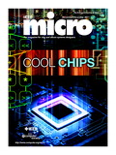
IEEE MICRO
Pioneering Insights in Microelectronics and ArchitectureIEEE MICRO is a prestigious journal published by the IEEE Computer Society, focusing on the latest advancements in the fields of electrical and electronic engineering, hardware, and software architecture. With a remarkable track record since its inception in 1981, this influential journal holds a Q1 classification in its respective categories, underscoring its significant impact in research and practical applications. The journal enjoys an impressive ranking within the 80th percentile in Electrical and Electronic Engineering and the 78th percentile in Hardware and Architecture, further cementing its reputation among the academic and professional community. Though not an open access journal, IEEE MICRO provides vital insights and cutting-edge research findings that shape the future of technology, making it an essential resource for researchers, practitioners, and students eager to stay at the forefront of innovation.

NEW GENERATION COMPUTING
Pioneering Research in Hardware and Software EngineeringNEW GENERATION COMPUTING is a prominent academic journal published by SPRINGER, specializing in the dynamic fields of Computer Networks, Hardware and Architecture, Software Engineering, and Theoretical Computer Science. With a commitment to disseminating high-quality research since its inception in 1983 and extending its coverage to 2024, this journal occupies a vital role in advancing knowledge and innovation within these critical domains. Holding prestigious Q2 rankings in Computer Networks and Communications, Hardware and Architecture, and Software, as well as a Q3 ranking in Theoretical Computer Science for 2023, NEW GENERATION COMPUTING attracts significant contributions from scholars and professionals around the globe. Researchers will find its rigorous peer-review process ensures the publication of impactful studies, while students gain access to cutting-edge research that shapes contemporary computing practices. Though it does not offer open access, the journal remains an invaluable resource in the academic community, fostering collaboration and dialogue among experts aiming to push the boundaries of technology.

Journal of Computer Science & Technology
Connecting global scholars through innovative research.The Journal of Computer Science & Technology, published by UNIV NAC LA PLATA, FAC INFORMATICA, serves as a vital platform for disseminating high-quality research in the expansive fields of computer science, including but not limited to Artificial Intelligence, Computer Science Applications, Computer Vision, and Software Development. Since its inception in 1999, this Open Access journal has prioritized accessibility, ensuring that groundbreaking research from Argentina and beyond reaches a global audience of scholars, practitioners, and students alike. With a broad spectrum of articles indexed in Scopus, the journal operates within the Q3 quartile across various categories, reflecting its commitment to evolving scholarship in the technology domain. Researchers interested in advancing their knowledge and contributing to the field will find the journal an essential resource for contemporary discussions and developments in computer science.
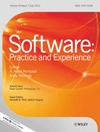
SOFTWARE-PRACTICE & EXPERIENCE
Advancing software knowledge through rigorous research.SOFTWARE-PRACTICE & EXPERIENCE, published by Wiley, is a prestigious journal that has significantly contributed to the field of software engineering since its inception in 1971. With a Q2 ranking in Software according to the 2023 category quartiles, it stands among the top tier of journals, positioned in the 79th percentile within Scopus’s Computer Science _ Software category. The journal focuses on disseminating high-quality research that reflects both academic rigour and practical application in software-related practices, ensuring that it remains relevant for researchers, professionals, and students alike. Although it does not currently offer Open Access options, it continues to provide invaluable insights and thorough explorations of contemporary issues in software development, methodology, and experience. As it converges toward 2024, SOFTWARE-PRACTICE & EXPERIENCE aims to foster a greater understanding of effective software practices in a rapidly evolving technological landscape.
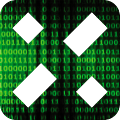
SoftwareX
Connecting Researchers to Transform Software PracticesSoftwareX is an innovative open-access journal published by Elsevier that has been championing advancements in the fields of Computer Science and Software since its inception in 2015. With a focus on presenting high-quality research, SoftwareX aims to foster collaboration and knowledge exchange among researchers and practitioners, advancing the way software and tools are developed and disseminated within the community. This journal operates under a flexible access model, allowing broad visibility and accessibility to its diverse readership. Positioned in the Q2 and Q3 quartiles of the Scopus ranking system within the domains of Computer Science Applications and Software respectively, SoftwareX stands as an influential platform for sharing cutting-edge methodologies and innovations. The journal's aim is not only to serve as a repository of knowledge but also to embolden practitioners and scholars alike to engage with and implement findings that can accelerate progress within the realms of software engineering and application. Situated in Amsterdam, Netherlands, SoftwareX has embraced an international reach, welcoming submissions that address complex challenges through novel software solutions.

PeerJ Computer Science
Catalyzing Research Excellence in Computer SciencePeerJ Computer Science is a leading open access journal published by PEERJ INC, dedicated to the field of computer science. Since its inception in 2015, it has made significant strides in promoting scholarly communication and accessibility to cutting-edge research. With an impressive impact factor reflected by a Q1 ranking in the Computer Science (miscellaneous) category and a Scopus rank of 51 out of 232, this journal stands at the forefront of its field. The journal's open access model ensures that groundbreaking findings are readily available to researchers, professionals, and students alike, fostering collaboration and innovation in the ever-evolving landscape of computer science. As it continues to publish until 2024 and beyond, PeerJ Computer Science remains an essential resource for those seeking to stay ahead in their research and practice.
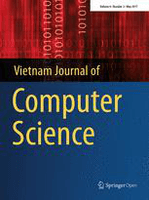
Vietnam Journal of Computer Science
Elevating the discourse in computer science through open access insights.Vietnam Journal of Computer Science, published by World Scientific Publishing Co Pte Ltd, serves as a prominent platform for researchers and professionals in the rapidly evolving field of computer science. Launched as an Open Access journal in 2013, it aims to disseminate high-quality research across various subfields, including Artificial Intelligence, Computational Theory and Mathematics, Computer Vision, and Information Systems. With its ISSN 2196-8888 and E-ISSN 2196-8896, the journal provides valuable insights and contributes to the growing body of knowledge in computer science, particularly in Southeast Asia. Despite its relatively recent establishment, the journal has achieved significant rankings, including Q3 status in multiple categories and notable visibility in Scopus metrics, evidencing its commitment to fostering innovative research. This journal is essential for those looking to stay at the forefront of computational advancements and applications, particularly in Vietnam and beyond, facilitating an engaging dialogue among scholars and industry professionals.

PROGRAMMING AND COMPUTER SOFTWARE
Innovating Programming Methodologies for Tomorrow's ChallengesPROGRAMMING AND COMPUTER SOFTWARE is a distinguished journal committed to advancing the field of software development and programming methodologies. Published by PLEIADES PUBLISHING INC, this journal has been a valuable resource since its inception in 1978, reaching out to researchers, professionals, and students alike. With an emphasis on rigorous peer-reviewed articles, the journal holds a Q3 ranking in the realm of Software according to the latest 2023 Category Quartiles. Though it does not offer open access, the journal ensures that high-quality research is disseminated to its audience, providing insights into evolving programming techniques, software engineering challenges, and innovative solutions. With its convergence of years extending to 2024, PROGRAMMING AND COMPUTER SOFTWARE remains a pivotal publication, fostering a deeper understanding of the complexities in computer programming while supporting the broader software community.

Journal of Grid Computing
Advancing the Frontiers of Distributed ComputingThe Journal of Grid Computing, published by Springer, stands as a pivotal resource in the dynamic field of computer science, particularly within the realms of Computer Networks and Communications, Hardware and Architecture, Information Systems, and Software. With an impressive Q1 ranking across these categories in 2023, the journal exemplifies excellence and rigor, catering to a diverse readership from researchers to industry professionals. Established in 2003, this esteemed journal is anchored in the Netherlands and releases cutting-edge research that reflects trends and advancements in grid computing technologies. Researchers can gain insights through its vast contributions, while institutions benefit from its prestigious standing within the SCOPUS framework, boasting high percentile ranks in multiple computer science categories. Though not open access, the journal provides unparalleled access options for institutional subscribers, solidifying its importance as a gateway to innovative discoveries in high-performance distributed computing.

Human-centric Computing and Information Sciences
Unlocking Potential in Human-Computer InteractionHuman-centric Computing and Information Sciences, published by the Korea Information Processing Society, represents a leading platform in the field of computer science, particularly focusing on the interaction between humans and computational systems. With an impressive Q1 ranking in the 2023 category of Computer Science (miscellaneous) and a commendable Scopus rank of #14/232 (94th percentile), this journal has established itself as a cornerstone for researchers and practitioners dedicated to advancing understanding in this vital area. Understanding the significance of making technology more accessible and effective for users, the journal has been an Open Access publication since 2011, promoting wide dissemination of knowledge without barriers. The journal's scope encompasses innovative methodologies, user experience design, and the integration of human factors into computing environments, making it essential reading for anyone interested in the intersection of technology and society. With all articles freely accessible, the journal not only contributes to scholarly discourse but also encourages collaboration among researchers worldwide, fostering further advancements in human-centric computing.